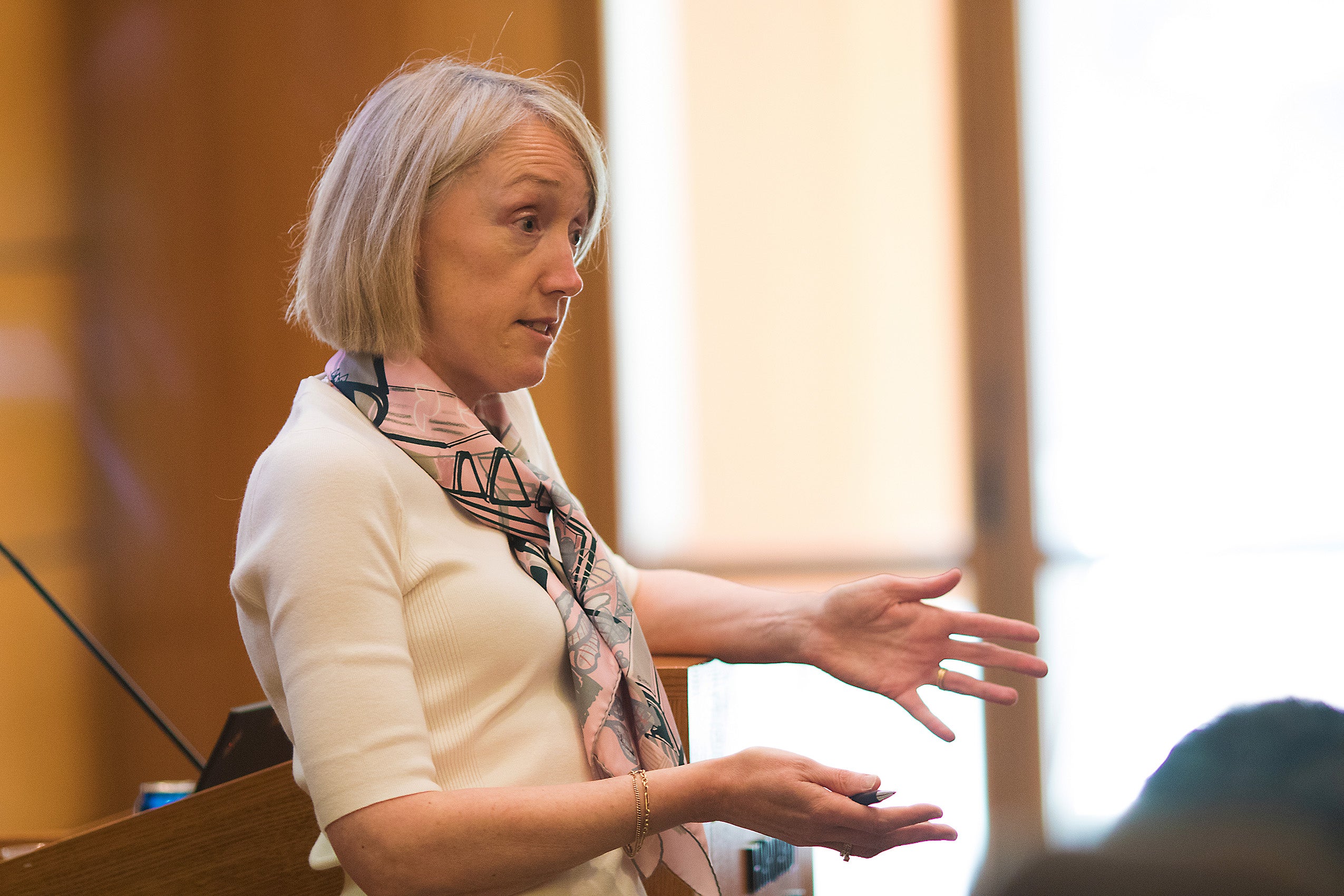Niamh Moloney LL.M. ’93, professor of Financial Markets Law and incoming Head of the Law Department (2018-2019) at the London School of Economics, spoke at Harvard Law School on Sept. 27 on the complex question of the United Kingdom’s exit from the European Union and its implications for the U.K.’s financial services industry. “We’re trying to figure it out,” she observed. “I think we’ve got the risks down; what we’re looking for now are the benefits.”
Following an introduction by HLS Professor Howell Jackson J.D./M.B.A. ’82, Moloney dove into her topic. “I’m consumed by financial services clearly; so is the City [London’s financial center], so is most of the government, but how important are they really?” she asked, noting that Brexit will also have impacts on areas ranging from agriculture and big pharma to the open skies arrangements that allow planes to across borders. While U.K. Prime Minister Theresa May’s letter of withdrawal to the European Council stated that financial services were very important, the Council’s negotiation guidelines for how they would approach Brexit did not mention them.
Moloney identified the decision-makers, negotiators and “hidden influencers” who will be involved, with a much more complicated picture on the EU side. For example, given that the EU member states have to accept the final agreement, “the big question out there right now is will the 27 states line up together? How hard is it going to be for them to present a united front in all of this?” Moloney asked, adding that on financial regulation issues, the “big potential divide” is between the 19 states who have adopted the euro as their common currency and the eight member states outside of the euro area.
Under Article 50 of The Treaty on European Union, the timeline for Brexit spans two years. Moloney explained that “we’re now in the divorce process,” working out the difficult initial settlements that will open the way for key negotiations on trade; “unfortunately, it’s going quite badly.” Later this month, the European Council will decide if enough progress has been made “to open up the holy grail: to negotiate how the UK will access the incredible value of the single market once it’s no longer a member of the EU.”
Why is it important for the U.K.’s financial services industry to get access back to the EU’s remaining 27 member states? Not only does the sector play a considerable role in the U.K. economy, but there are broader concerns: “Do you start losing U.S. business because the City looks less attractive? Do you start losing southeast Asian business because there’s less trade, less liquidity in London?” Brexit would of course have significant implications for the EU as well: “What’s happening is that the EU 27 is losing what you might call its legally frictionless access to its investment banker. The City is the pipeline through which venture capital, private equity, trading in derivatives, clearing in derivatives [flow] … It becomes difficult to raise funding, to risk manage; diversification becomes harder.”
Moloney’s talk delved deeply into the specific business, regulatory and legal issues that are emerging in Brexit, and she offered interesting sidelights as well. For example, despite political unity — “there is a solid wall right now; no negotiations on trade until the divorce is done, no side deals behind the scenes” — competitive dynamics are emerging: Dublin, Amsterdam, Frankfurt and Luxembourg are all campaigning as big banks consider relocating their operations to ensure that they can still access the EU market. “Watch closely the growth of private schools in key European countries,” Moloney suggested. “Investment bankers want good schools, they want good skiing … so of course it’s about proportionality and the regulatory environment, but it’s also about infrastructure.”
In the end, Moloney argued that political, institutional and design challenges make it difficult to see an ambitious or creative foreign trade arrangement taking place. “My prediction is that it’s going to be a hard Brexit, with a very, very limited free trade agreement” in sectors critical to the EU. “We will allow you access to our market, but you’re going to have to be supervised by the European authorities, rather than relying on UK law.”
With the interests of the UK, the EU and the rest of the world interlocking, Brexit’s impact is “highly dynamic and difficult to predict,” Moloney said, noting that it’s not clear what the UK’s own government wants, the EU itself is in a state of flux, and the Trump administration could even play a role. If there’s deregulation in the U.S., for instance, “predicting how the EU reacts to that is going to be critical. It may become more amenable to the UK — we need our investment banker — or it may take the view that it’s a competitive environment, we’re not reducing our controls, we’ll look inwardly.”
A specialist in EU financial market regulation, Moloney’s books include “EU Securities and Financial Markets Regulation” (Oxford University Press, third edition, 2014), the first monograph on this topic. She is an editor of the Oxford Handbook of Financial Regulation and the Cambridge University Press Series on International Corporate Law and Capital Market Regulation, and sits on the editorial boards of several journals.
Moloney’s talk was sponsored by International Legal Studies and the Program on International Financial Systems.
